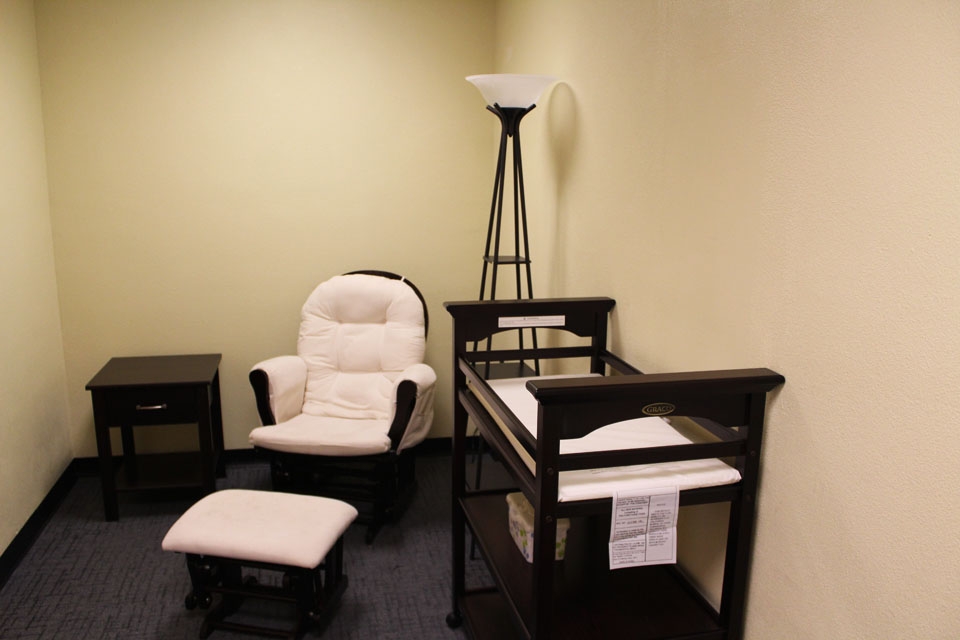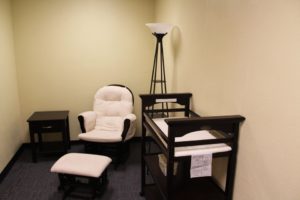

The lactation room is on the third floor of the Student Union. Nursing mothers can contact Duquesne’s human resources department to gain card swipe access to the room, which they can reserve for time slots of 30 minutes each to nurse babies.
Carolyn Conte | Staff Writer
Nestled near the hidden women’s restroom on the third floor of the union, mothers from all over Duquesne’s campus — students, teachers and staff — are offered a space to nurse their babies.
This lactation room, unknown and unnoticed by most of the Duquesne community, was created in late 2013 and includes a comfortable chair, a table to pump breastmilk, an electric outlet, a supply table and a door that automatically locks to ensure privacy.
The room, which cost approximately $5,000, is designed for women in need of balance between work and parenting responsibilities, according to Ryan Dawson, associate director of human resource management.
“We want to provide a safe, friendly environment where our nursing moms can feel comfortable,” Dawson said.
The room was created in response to the federally mandated Affordable Care Act, which requires that employers must offer “reasonable time” for mothers to nurse in a private space, “other than a bathroom, that is shielded from view and free from intrusion of others” according to text of the Affordable Care Act.
In Pennsylvania, mothers may breastfeed “in any location, public or private,” according to the Freedom to Breastfeed Act. There is no policy at Duquesne on breastfeeding in public, according to Dawson.
Parsons acknowledged breastfeeding can be a sensitive topic.
“I think public breastfeeding is very natural and women should feel comfortable with it. Women should have the right to, or have a private space if they are not — there are a lot of women who would want a private space,” Parsons said. “Some people feel uncomfortable because they have different ideas of who to share their bodies with.”
Dawson said university employees may reserve 30-minute time slots in the room by contacting the Office of Human Resources. Students may schedule a time slot through Brigitte Szivos, associate director of operations in the Union.
Correction: An earlier version of this story incorrectly stated that both employees and students should contact Brigitte Szivos to reserve a time slot.
Mothers sometimes find the time slots are filled up already. It can be difficult for them to find a time that their bodies are lactating when they are on a break, and when they have enough time to pick up their babies from the campus daycare, according to Mary Parish, graduate assistant for the Center for Women’s and Gender Studies.
There is no current standard set by state or federal law which dictates the amount of space required for nursing mothers. However, associate history professor Elaine Parsons worried a single lactation room might not be enough for mothers spread out across campus.
“It seems like it’s not reasonable to make just one lactation room in a campus this huge,” Parsons said. “You also have to think about where are their babies?” she said, “There is the oversubscribed daycare on campus that is a 10 minute walk [from the union]… so I am wondering if it is in reality a [sufficient amount of time].”
Lori Koelsch, director of undergraduate psychology and a nursing mother, said she is grateful to have the option of using the private lactation room, calling it a “good first step” from Duquesne.
“It is important to make sure that [the lactation room] is actually meeting the needs of the mothers who would use it most,” Koelsch said. “No mother should have to choose between breastfeeding and financially supporting her family or pursuing her education.”



